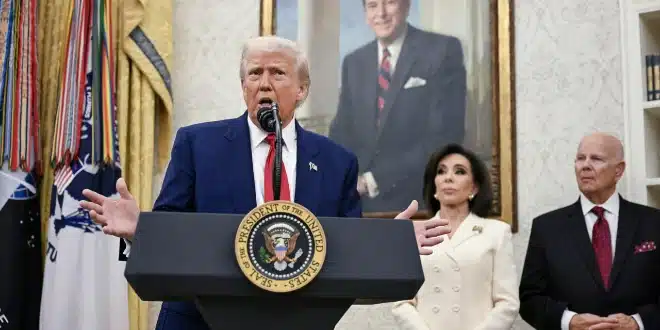U.S. President Donald Trump has confirmed that he advised Israeli Prime Minister Benjamin Netanyahu to refrain from launching military operations against Iran, citing progress in ongoing diplomatic efforts between Washington and Tehran. In comments made Wednesday, Trump expressed confidence that the negotiations could result in a new agreement aimed at de-escalating tensions over Iran’s nuclear program.
In response to a question about whether he had explicitly urged Netanyahu to delay any action that might disrupt the talks, Trump acknowledged that he had done so. He indicated that he told the Israeli leader such action would be untimely given the momentum building in the discussions. Trump emphasized the importance of allowing the process to continue, describing the conversations with Tehran as constructive and potentially nearing a resolution.
He stated that reaching a diplomatic solution could help avoid bloodshed and expressed belief that Iran was interested in reaching a deal. His comments come amid a series of high-level exchanges between Iranian and U.S. officials, which have included five rounds of dialogue in recent weeks. These mark the most significant engagement between the two governments since the U.S. unilaterally exited the Joint Comprehensive Plan of Action (JCPOA) in 2018 under Trump’s leadership.
Potential Concessions and Regional Diplomacy
Iran has signaled it may consider allowing U.S. inspectors to access its nuclear facilities under the United Nations framework, should a mutually acceptable deal be finalized. Iran’s atomic energy chief Mohammad Eslami indicated that Tehran, which has typically barred inspectors from adversarial countries, could reconsider this stance if its conditions are met through a new agreement.
Despite past resistance, Eslami noted that international oversight, including that from the International Atomic Energy Agency (IAEA), could expand to include U.S. personnel if Iran’s requirements are addressed. The U.S., in turn, continues to demand comprehensive verification mechanisms as a prerequisite for lifting sanctions.
On the diplomatic front, Iranian President Masoud Pezeshkian, currently visiting Oman, expressed appreciation for Muscat’s role in facilitating communication between Iran and the U.S., who have not maintained formal diplomatic relations since 1979. Accompanying the president, Iranian Foreign Minister Abbas Araghchi said the schedule for the next round of negotiations could be finalized within days.
While dialogue continues, Iranian officials have reiterated firm positions on core aspects of their nuclear program. The enrichment of uranium remains a central issue, with Iranian authorities declaring it a non-negotiable element of national policy. Foreign Ministry spokesman Esmaeil Baqaei reinforced this stance, stating that enrichment is integral to Iran’s nuclear industry and sovereignty, and any proposal contradicting that principle would not be accepted.
Technical Disputes Remain as Diplomatic Channels Open
Under the terms of the 2015 nuclear accord, Iran agreed to enrich uranium to no more than 3.67 percent purity, well below the threshold necessary for weapons-grade material. However, since the U.S. withdrawal from that deal and subsequent imposition of sweeping sanctions, Iran has increased its enrichment levels to as high as 60 percent.
Although still under the 90 percent level considered necessary for a nuclear weapon, this development has raised alarms among Western powers and regional rivals, particularly Israel. The Israeli government continues to view Iran as its principal security threat due to Tehran’s support for militant groups in the region, including Hamas in Gaza. Israel has conducted direct operations against Iranian military infrastructure and repeatedly warned of preemptive action should Iran’s nuclear capabilities cross certain thresholds.


